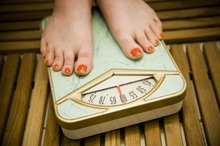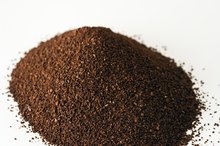Why Is it Bad for Kids to Drink Coffee?
Giving coffee to small children in America is almost taboo. However, with the popularization of coffee houses and specialty coffee drinks, more and more kids and teens are drinking coffee. Contrary to popular belief, coffee does not stunt a child's growth as originally thought, but there are many other side effects of coffee that have been proven to have negative effects on children and teenagers.
Insomnia
Children ages 5 to 12 need at least 11 hours of sleep per day, and teenagers need nine to 10. These numbers seen attainable, but with hectic schedules and early wake-up times, sometimes they are impossible. More and more kids are using coffee to boost their energy levels during the day, but this could be a contributor to lack of sleep. Coffee is a stimulant that has five times more caffeine per serving than a soda, and caffeine can last in the body for up to eight hours, contributing to sleep loss, which only serves to perpetuate the cycle. It is best for children and teenagers to avoid coffee to boost energy levels.
- Children ages 5 to 12 need at least 11 hours of sleep per day, and teenagers need nine to 10.
- Coffee is a stimulant that has five times more caffeine per serving than a soda, and caffeine can last in the body for up to eight hours, contributing to sleep loss, which only serves to perpetuate the cycle.
Cavities
Effects of Caffeine on Toddlers
Learn More
Coffee is acidic. Acidic drinks can cause damage in the mouth by weakening teeth; this leads to a decline in tooth enamel and an increase in cavities. Children are more prone to cavities than adults, as it takes years for new enamel to harden after baby teeth have been lost and adult teeth have come in. Children who drink coffee are more likely than adults to have oral health issues, such as cavities and loss of enamel.
- Acidic drinks can cause damage in the mouth by weakening teeth; this leads to a decline in tooth enamel and an increase in cavities.
- Children who drink coffee are more likely than adults to have oral health issues, such as cavities and loss of enamel.
Decreased Appetite
Coffee is a stimulant, which can lead to decreased appetite. Growing children need a balanced diet full of protein, whole grains, fruits and vegetables. When kids drink coffee, the stimulant effect is likely to lead to a decrease in appetite and a decline in overall nutrition.
Bone Loss
Can Drinking Coffee Cause Dry Mouth?
Learn More
Coffee is a diuretic -- it increases urine production. Increased urination causes the loss of calcium from the body, which can lead to bone loss. In addition to being a diuretic, it also contains large amounts of caffeine that leach calcium from the body. For every 100 mg of caffeine ingested, 6 mg of calcium are lost. For children, calcium is essential for bone growth.
- Coffee is a diuretic -- it increases urine production.
- In addition to being a diuretic, it also contains large amounts of caffeine that leach calcium from the body.
Hyperactivity
Coffee can create a host of behavioral problems in children, including hyperactivity, restlessness and inability to concentrate. This is because the caffeine in coffee is a stimulant that increases energy and alertness. While adults may benefit from this side effect, it can be damaging to school-aged children who are required to pay attention and sit still during instruction at school. The effects of caffeine can last for hours -- as long as an entire school day -- and can have negative effects on peer relations, studying and grades.
- Coffee can create a host of behavioral problems in children, including hyperactivity, restlessness and inability to concentrate.
- The effects of caffeine can last for hours -- as long as an entire school day -- and can have negative effects on peer relations, studying and grades.
Related Articles
References
- To Be Informed: Can Coffee Harm Your Teeth?
- Green Parenthood: 6 Foods that May Affect Bone Health
- Coffee consumption and health: umbrella review of meta-analyses of multiple health outcomes
- Coffee consumption and health: umbrella review of meta-analyses of multiple health outcomes
- Impact of coffee components on inflammatory markers: A review - ScienceDirect
- Coffee consumption and health: umbrella review of meta-analyses of multiple health outcomes
- Impact of coffee components on inflammatory markers: A review - ScienceDirect
- Coffee consumption and health: umbrella review of meta-analyses of multiple health outcomes
- Consumption of coffee or caffeine and serum concentration of inflammatory markers: A systematic review - PubMed
- Associations of coffee drinking with systemic immune and inflammatory markers
- Effects of coffee consumption on subclinical inflammation and other risk factors for type 2 diabetes: a clinical trial - PubMed
- Consumption of coffee or caffeine and serum concentration of inflammatory markers: A systematic review - PubMed
- Consumption of coffee or caffeine and serum concentration of inflammatory markers: A systematic review - PubMed
- Coffee consumption modulates inflammatory processes in an individual fashion - PubMed
- Chronic Inflammation - StatPearls - NCBI Bookshelf
- Consumption of coffee or caffeine and serum concentration of inflammatory markers: A systematic review - PubMed
- Coffee consumption and health: umbrella review of meta-analyses of multiple health outcomes
Writer Bio
Jennifer Oster holds a Bachelor of Arts in social sciences from Louisiana State University and is also a certified lactation counselor. An expert in the field of infant and maternal nutrition, she began writing professionally in 2005 and has been featured in many nationally acclaimed magazines.









